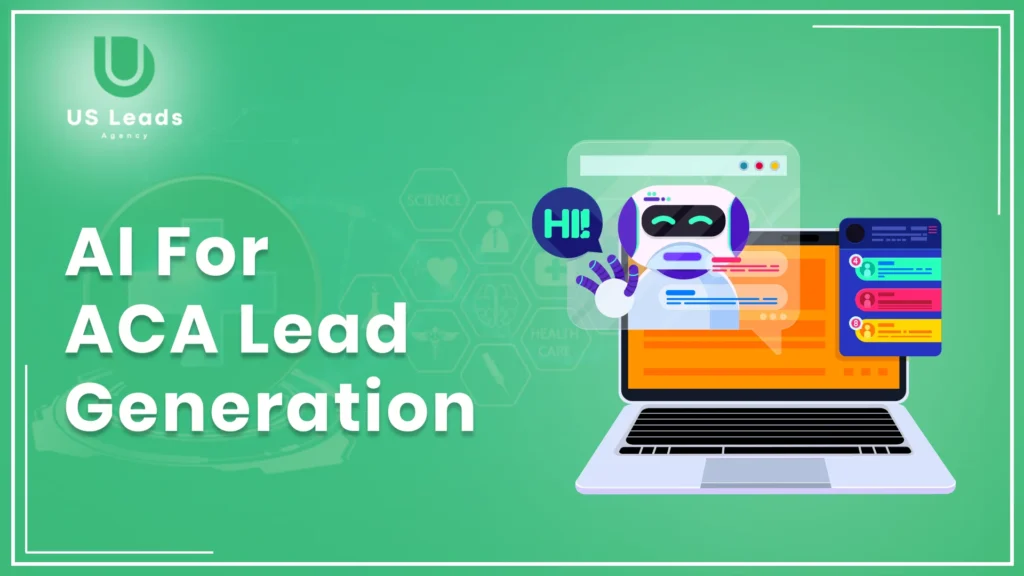
Artificial Intelligence (AI) is revolutionizing lead generation in the Affordable Care Act (ACA) health insurance sector. By 2024 stats by Wiser Notify, AI-driven tools are projected to enhance lead quality and conversion rates by up to 50%, offering insurers a competitive edge in a saturated market.
This article explores how to use AI for ACA lead generation, providing insights into its benefits, challenges, and future prospects.
Key Takeaways:
- AI-driven tools create tailored marketing strategies, increasing engagement and conversion rates.
- Despite upfront costs, AI delivers a strong ROI through better-targeted leads and reduced manual efforts.
- AI ensures adherence to ACA regulations by automating compliance checks and data handling processes.
- The role of AI will expand with advancements in machine learning and predictive analytics, making ACA lead generation more intuitive and effective.
- AI complements rather than replaces human efforts, supporting agents with data insights and automation.
- Successful AI integration requires addressing cost barriers, data privacy concerns, and the need for skilled personnel.
Table of Contents
Understanding ACA Lead Generation:
ACA lead generation involves identifying and engaging individuals eligible for health insurance under the Affordable Care Act. Traditional methods relied on manual data collection and broad advertising, often resulting in inefficiencies and high costs. The integration of AI addresses these challenges by automating processes and enhancing targeting precision.
5 Effective Ways To Use AI For ACA Lead Generation:
1. Enhanced Data Analysis and Segmentation:
AI-powered tools analyze vast datasets to identify patterns and segment audiences effectively. Predictive analytics can pinpoint prospects based on factors like income, location, and healthcare needs, improving lead quality.
2. Personalized Marketing Campaigns:
Machine learning algorithms enable hyper-personalization by tailoring messages to individual preferences and behaviors. This approach leads to higher engagement and conversion rates for ACA leads.
3. Real-Time Lead Scoring:
AI systems assess a prospect’s likelihood to convert based on interactions and demographic data, allowing sales teams to focus on high-quality leads and reduce time spent on less promising prospects.
4. Chatbots and Conversational AI:
AI-powered chatbots provide instant responses, guide prospects through the enrollment process, and collect valuable data, operating 24/7 to ensure no lead is lost due to delayed responses.
5. Predictive Analytics for Future Trends:
AI predicts future trends, helping ACA lead generation teams anticipate shifts in demand and optimize campaigns proactively.
Benefits of AI in ACA Lead Generation:
- Cost Efficiency: Automation reduces overheads and optimizes resource allocation.
- Improved Accuracy: AI minimizes human error in data analysis and targeting.
- Scalability: AI systems handle large datasets and campaigns, enabling growth without proportional cost increases.
- Better ROI: Focusing on high-quality leads enhances return on investment for marketing campaigns.
Challenges and Ethical Considerations:
Despite its advantages, integrating AI into ACA lead generation presents challenges, including:
- Data Privacy: Handling sensitive health-related information demands stringent compliance with HIPAA and other regulations.
- Bias in Algorithms: AI systems must be designed to avoid biases that could lead to discriminatory practices.
- High Initial Costs: Implementing AI solutions may require significant upfront investment, which could deter smaller players.
Addressing these challenges requires a balanced approach that combines technological innovation with ethical responsibility.
Future Trend:
As AI continues to evolve, its role in ACA lead generation will expand further. Emerging technologies like Natural Language Processing (NLP) and advanced machine learning models will enhance customer interactions, predictive accuracy, and decision-making processes. Integration with other technologies, such as block chain for secure data sharing, will also shape the future of ACA marketing strategies.
Conclusion – AI For ACA Lead Generation:
The role of AI in ACA lead generation is both transformative and indispensable. By enhancing targeting, personalization, and operational efficiency, AI empowers marketers to achieve superior outcomes. While challenges persist, the benefits of adopting AI far outweigh the drawbacks, making it a critical tool for navigating the competitive landscape of ACA lead generation.
FAQs:
How does AI improve ACA lead generation?
AI enhances ACA lead generation by utilizing predictive analytics, data segmentation, and personalized marketing to efficiently target high-quality leads.
Is AI cost-effective for small businesses in ACA lead generation?
While initial AI tool investments can be significant, the long-term benefits of improved efficiency and higher ROI make it cost-effective for businesses of all sizes.
How To generate leads for life insurance?
Generating life insurance leads involves strategies like leveraging AI for data analysis, personalized marketing, and real-time lead scoring to identify and engage potential clients effectively.
